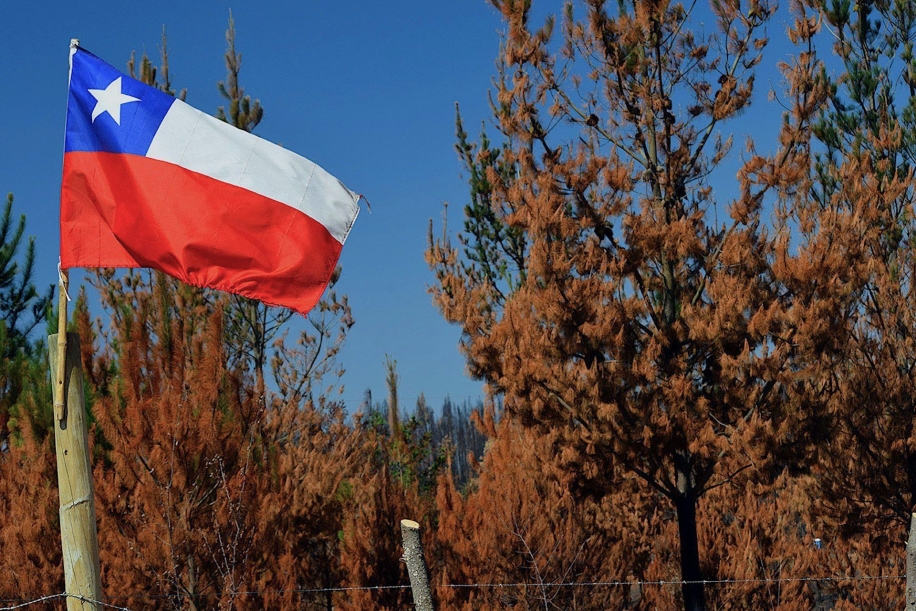

Chilean flag stands out from the burned pine plantations -
In January and February 2017, 5,274 wildfires raged in Chile, burning more than half a million hectares, destroying over 1,000 buildings, and killing eleven people. The fires started in monoculture timber plantations. The fire was, at that time, the worst in the country’s history.
Chile’s Wildfires: Another Pinochet Legacy
Organization: Global Justice Ecology Project
Photographer: Orin Langelle
Organization: Global Justice Ecology Project
Exhibit Title: Chile’s Wildfires: Another Pinochet Legacy
Location: Chile
When wildfires broke out in Chile in 2024, I began a redux of my previously published photo essay about Chile’s 2017 wildfires – the worst in the country’s history. In the years since, more severe wildfires have scarred the landscape, with 2024’s fires the deadliest on record.
Media blames the fires on climate change, El Niño, higher temperatures, strong winds and drought. While true, another major contributing factor to the wildfire disasters is widespread plantations of highly combustible pine and eucalyptus trees.
Chile has approximately 2.2 million hectares of these flammable plantations that fuel the out-of-control wildfires and firestorms.
The human toll in 2024 is over 100 killed with hundreds missing. More than 43,000 hectares have burned. This year’s wildfires and firestorms have been catastrophic.
Vast expanses of industrial pine and eucalyptus plantations grow on land stolen from Mapuche and rural communities during the dictatorship of Augusto Pinochet under Forest Law 701. Today the same Pinochet constitution is still law in Chile as is Law 701.Wildfires are another of Pinochet’s deadly legacies.
Anne Petermann, Lucio Cuenca
When wildfires broke out in Chile this February 2024, I began a redux of my previously published photo essay about Chile’s 2017 wildfires – then the worst in the country’s history. In the years since, more severe wildfires have scarred the landscape, with this year’s fires now the deadliest on record.
From the Photographer’s Statement in my 2017 photo essay:
An international delegation from the Campaign to STOP Genetically Engineered Trees arrived in Santiago, Chile, in March 2017, to document the social and environmental impacts of the forestry industry in the country, as well as its links with recent forest fires, which were the worst in Chile's history.
The fires began in January 2017. It is estimated that eleven people died, 1,500 homes were destroyed, thousands of people displaced, and over 500,000 hectares decimated.
The Latin American Observatory of Environmental Conflicts Observatorio Latinoamericano de Conflictas Ambientales – OLCA, sponsored the delegation. Another sponsor of the delegation was Global Justice Ecology Project.
I accompanied the delegation as a photojournalist and participant.
The historical context of what happened in past decades continues to affect Chile today. The legacy of neoliberalism in the Americas is very long and tragic. September 11 is a notorious anniversary, always to remain as a date etched in the minds of Chileans. In 1973, this was the day that General Augusto Pinochet took power in Chile in a coup supported by the CIA and the United States government. Salvador Allende, the socialist President of the Unidad Popular, who had been democratically elected, was killed, marking the end of civilian government.
U.S. support was crucial to the coup, and also to the consolidation of power afterwards. With the influence of the “Chicago Boys” of the U.S., neoliberal proponents of the free market, the dictatorship implemented economic liberalization,including monetary stabilization, the elimination of protective tariffs for local industries, a ban on unions, and the privatization of the social security and hundreds of national companies.
From the beginning of the new military dictatorship, very severe measures were applied.
During the time that Pinochet reigned, investigations have confirmed between 1,200 and 3,200 people were murdered, more than 80,000 people forcibly interned, and up to 30,000 people tortured.
Sometimes democracy must be bathed in blood – Augusto Pinochet
The establishment of Forest Decree Law 701 in 1974, while General Augusto Pinochet reigned, subsidized the expansion of tree monocultures. This began the great expansion of monoculture plantations of pine and eucalyptus for the paper and wood factories. Since then, many corporations have purchased land, destroying the once abundant native forests.
The history of Chilean forests is painful for Mapuche communities. The invasion of Mapuche ancestral lands (Wallmapu) in modern times began with the approval of Forest Ordinance 701 (Decree Law 701) in 1974. Many indigenous inhabitants were evicted and marginalized. During the Pinochet regime, the 10 million hectare land allocated to the Mapuche was reduced to only 350,000 hectares, roughly 3% of their original territory.
Since the fall of the dictatorship, one government administration was changed for another; Some Mapuche lands have been seized, and some have been returned, creating a “dispersed mosaic” of indigenous lands, which were once part of the “Mapuche Nation.”
Global Justice Ecology Project
Campaign to STOP Genetically Engineered Trees
OLCA - Latin American Observatory of Environmental Conflicts Observatorio Latinoamericano de Conflictas Ambientales - OLCA
WRM - World Rainforest Movement
MST - Movimento dos Trabalhadores Rurais Sem Terra or Brazilian Landless Workers Movement
Orin Langelle
POB 124, Randolph, NY 14772
+1.716.536.5669
orin@langellephoto.org
Make Comment/View Comments